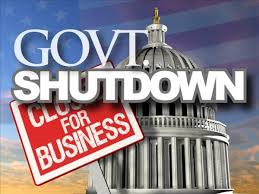The major news headlines everywhere are focused on the government shutdown. The government shutdown is the result of the recent vote by House of Representatives opposing funding for Obamacare (Obama’s healthcare law) as part of a bill to pay for government operations after the close of the fiscal year on September 30th. Questions remain as to how this government shutdown will affect the economy.
When the government shuts down, it is estimated that about 800,000 federal employees will be out of work. Obviously the workers’ lost wages are a problem, but these lost wages will also bleed into other related areas. In particular, some businesses will be forced to reduce or even suspend their services until the shutdown is over. This will lead to cut back in spending for everyone involved in the cycle. Depending on the amount of time the government is shut down, this reduction in spending could have huge implications for the economy. Another important factor to keep in mind is the uncertainty factor related to just the mere threat of a potential government shutdown. The financial markets generally react negatively to business uncertainty so there is the potential for unknown damage in this area.
If the government is shut down for even a relatively brief period of time such as a few days it could have a significant impact on the nation’s economy. One analyst estimated that a month’s shutdown could cost the economy about $55 million. Due to the government shutdown, the Small Business Administration has suspended operations, which means that no loans will be processed. Even tourism and air travel will be threatened since travelers will not be issued visas due to the temporary closing of government offices. In short, many businesses and sectors will be touched by the temporary suspension of government services.
A shutdown for any length of time will significantly cut the growth of the US economy. Most importantly, the temporary suspension of government services will result in a dip in the gross domestic product. Some analysts believe that the short term closure of certain government offices could cut the fourth-quarter economic growth by as much as 1.4 percentage points. While the effects of a government shutdown will be just an inconvenience for some, they will affect others more harshly. Some analysts believe that the long term effects could be hazardous to the economy, even to the point of causing a recession.
If you have tax questions or a tax debt you are unable to pay, our tax settlement professionals are happy to discuss your tax resolution options free of charge. For more information about our services, visit us today at www.professionaltaxresolution.com or call us at 877.889.6527. With over 16 years in the business of resolving tax debt, we have a thorough understanding of tax law together with the experience to know which settlement option will be the best fit for your specific set of circumstances





